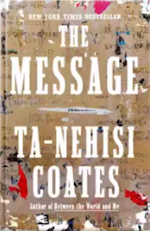These aren’t all 2024 releases, just books I happened to read this year that I liked. I know I am missing a few here but it’s the end of the year and I am weary.
The Message, by Ta-Nehisi Coates

This book is an insightful collection of essays that focus on the workings of violence and power in history and across cultures. It is in part a travel journal, describing Coates’ visits to Senegal and Israel. But it is also a reflection on the art of writing itself, and Coates’ journey to honing his craft from his youth in Baltimore. The precision and care that he demonstrates in selecting his words and building his sentences reminds me of Japanese wood joinery.
It may seem strange that people who have already attained a position of power through violence invest so much time in justifying their plunder with words. But even plunderers are human beings whose violent ambitions must contend with the guilt that gnaws at them when they meet the eyes of their victims.
Jefferson’s Pillow, by Roger W. Wilkins

Roger Wilkins was a giant of the civil rights movement who died in 2017. This book was written well before that, in 2001. Although it is nearly a quarter of a century old, its subject matter feels highly relevant to the present moment: how can Black Americans be patriotic? It is the same question that Frederick Douglass addressed in his famous Fourth of July speech. Wilkins focuses in particular on four founding Virginians: George Washington, Thomas Jefferson, George Mason, and James Madison, all of whom enslaved people. He holds a spotlight up to their hypocrisy, not to denigrate, but to understand the place of himself and his family in the American story.
Middlemarch, by George Elliot

This is my favorite book. I’ve read it more times than I can count, usually at a critical juncture in my life. I read it this year before we had our second daughter. My feelings about this book have evolved over the years with each time I’ve read it. I began by identifying with its main character, Dorothea, who embraces an austere religion in her youth before she eventually adopts a more openminded view (I can relate). But as I’ve gotten married and started having kids, I’ve come to focus more on the characters who are also parents. Caleb and Susan Garth, for instance, manage to raise honest, upright children like their daughter Mary. On the other hand, the Vincy children (Fred and Rosamond) feel like a cautionary example of how to raise children who are self-centered and lazy.
The Fraud, by Zadie Smith

I finished this book in early January 2024 with no awareness of how relevant it would become at the end of the year after Trump’s re-election. It’s based on a real-life trial that took place in late 19th-century London over a butcher, Thomas Castro, who claimed to the heir to a fortune name Roger Tichborne. The evidence that Castro was a fraud was voluminous—he looked nothing like the man he claimed to be, but he gained a popular following through his claim. The parallels to our present time are obvious.
Ours Was the Shining Future, by David Leonhardt

Was life better in the old days? Maybe not, but David Leonhardt presents a strong case in the early chapters of this book that America was once on a trajectory to a much more evenly shared prosperity than we are today. In my grandparent’s time we had CEOs giving up their wages to expand the middle class. Today get Elon Musk and Jeff Bezos openly buying political access to prioritize billionaire tax cuts. What happened? Leonhardt’s answer is that we abandoned the project of organized labor. I found this book hard to put it down because of his gripping narrative style, which focuses on telling the stories of people whose lives illustrate the central argument.
The Utopia of Rules, by David Graeber

I loved this collection of cogent essays exploring the nature and history of bureaucracy, which is a big part of my professional life. Graeber asks: why do we love to complain about bureaucracy, but continue to make more and more of it? His answers are enlightening and surprising. I particularly loved the second essay in the collection, which takes an extensive detour to discuss the politics of Star Trek, with the conclusion that the Federation is the realization of the ideal Leninist Soviet state (no elections, no classes, no money, no need for secret police to enforce order). I also appreciate and agree with Graeber’s Iron Law of bureaucracy, which is that any attempt to reduce paperwork only leads to an increase, because of the additional measures needed to enforce it. This book pairs nicely with Ours Was the Shining Future.